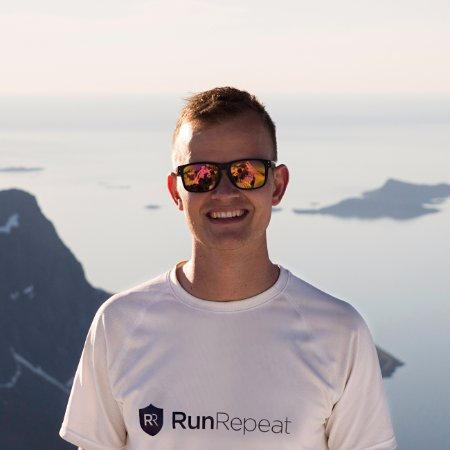Le scarpe da corsa costose non sono migliori di quelle più economiche (studio)
Based on 134,867 reviews of 391 running shoes from 24 brands, this research compares the list price of running shoes with their ratings. The main conclusion is that expensive running shoes are no better than cheaper ones. In fact, cheap running shoes are better valued than expensive ones. You can use any content (graphics, comments, etc.) as long as you cite the original source. For interviews, please contact lina@runrepeat.com or +1 817 945 66 06.
Conclusions first
Based on 134,867 reviews and 391 running shoes from 24 brands:
- The higher the list price, the lower ratings the running shoes get.
- The 10 most expensive running shoes (average list price: $181) are valued 8.1% worse than the 10 cheapest running shoes (average list price: $61).
- Specializing running shoe brands are rated 2.8% better than running shoes from a generic sports brand.
- The three best rated brands are: #1 Skechers, #2 Saucony and #3 VibramFiveFingers, while the three worst rated are #22 New Balance, #23 Adidas and #24 Reebok. The Adidas group owns both Reebok and Adidas.
- The three most affordable brands are #1 Skechers, #2 Vivobarefoot and #3 PUMA, while the three most expensive are #22 On, #23 Newton and #24 Hoka.
General informations
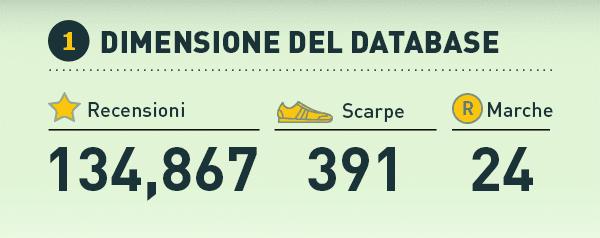
RunRepeat.com is a free, ad-free platform where runners and experts review running shoes. Our mission is to create transparency in the running shoe market. To do this, we provide runners with free access to aggregated information on reviews , rankings , and unique ways to compare running shoes . We are totally independent. We don't recommend any type of shoe, brand or store, but we let the community judge which running shoes are good and which ones to avoid. “ We conducted this research to spread the word that “the higher the price, the higher the quality” does not apply to running shoes” says Jens Jakob Andersen, founder of RunRepeat.com, who claims: “ Brands have a strong incentive to promote high-tech running shoes, but our research clearly illustrates that runners who buy more expensive running shoes are less satisfied than those who buy mid-level or cheap running shoes ."
Methodology
Our results are based on the following procedure:
- We processed 134,867 reviews of 391 running shoes on RunRepeat
- We have compiled the list prices of 24 brands on the same shoes
- We conducted a regression analysis on the two variables
Results
The results are divided into:
- Shoe-specific results
- Brand-specific results
Running Shoe Specific Results: Comparison of 391 Running Shoes
The chart below plots 391 running shoes on two metrics: list price in dollars on the x-axis and average consumer rating on a scale of 0-100 on the y-axis. The data is randomly plotted, which is the crux of our conclusion: there is no statistical correlation between a shoe's list price and its valuation. In fact, when conducting a regression analysis, the data suggests that cheaper running shoes are better valued than expensive ones.
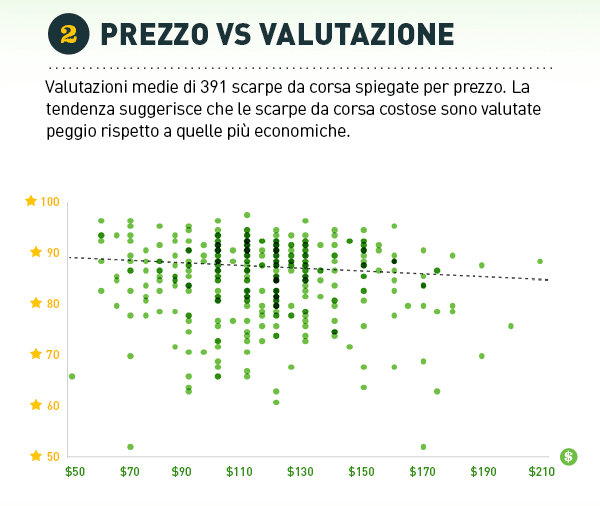
Average ratings of 391 running shoes explained by price. The trend suggests that expensive running shoes are priced worse than cheaper ones. We went even deeper and looked at the 10 most expensive running shoes and the 10 cheapest. In this case, the results were surprising. The 10 cheapest running shoes had an average list price of $61 with an average rating score of 86 out of 100. If you look at our ranking of the best rated running shoes, you will see that only 18.9% of the 391 running shoes are valued better, on average, than the 10 cheapest. In other words, mid-level running shoes are rated worse than budget ones. Furthermore, if you look at the 10 most expensive running shoes, i.e. branded running shoes, runners are not satisfied to the same extent as they are with the cheapest shoes. At 3x the price, name-brand running shoes leave runners 8.1% less satisfied and 6.0% less satisfied than average-rated shoes. “ People buy shoes three times more expensively and are 8% less satisfied ,” says Jens Jakob Andersen, founder and CEO of RunRepeat.com. 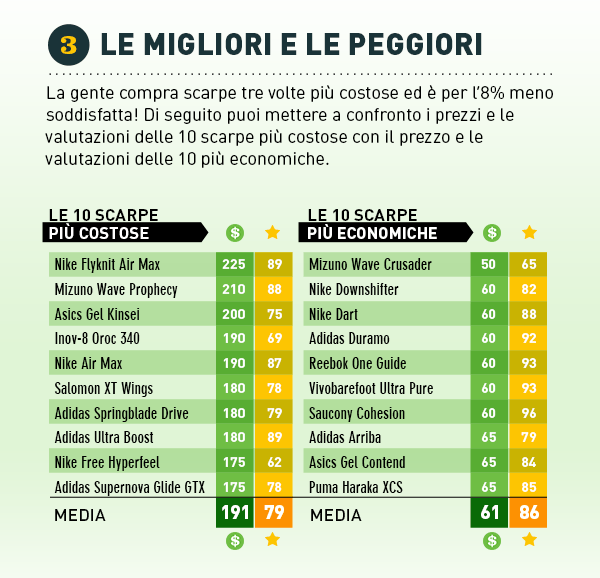
We also looked at the 30 best running shoes and the 30 worst running shoes and the results are always the same. Expensive running shoes get worse reviews: “ Runners are less satisfied with name-brand running shoes. I know that higher prices create higher expectations, but, in any case, the price should reflect the quality of the product and so the ratings ,” says Jens Jakob Andersen.
Brand-specific results: Comparison of 24 running shoe brands
In this section, we have focused on the division of running shoe brands and not the specific models previously discussed. This was not done to promote any specific brand. Our research has no incentive other than to share information with consumers. Below, you will find a graph showing average ratings (y-axis) versus list prices in dollars (x-axis). As with specific running shoe models, the higher the list price, the worse the ratings. In fact, by carrying out a correlation, it is highlighted that an increase of $50 in the list price of a shoe would generate a worse rating of 1.4 points on average.
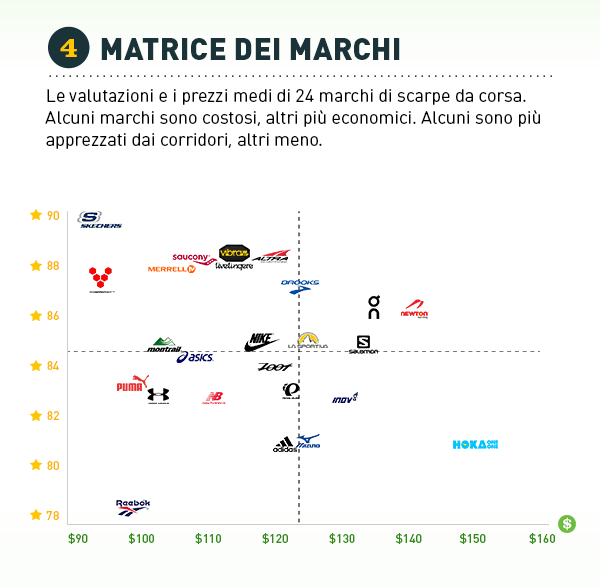
Some brands are good at marketing, others at making adorable running shoes, and still others at combining great marketing with a fantastic product. The chart below illustrates the average rating of each of the 24 running shoe brands. “ We expected specialty running shoe brands to significantly outperform generic sports brands, but looking at the data, the difference is slight. Specialized running shoe brands are rated only 2.8% better than general sports brands,” says Jens Jakob Andersen. Additionally, the second bar chart illustrates the average list price of 24 different running shoe brands. “There is nothing wrong with a company that sells high-quality running shoes, but, in my honest opinion, the problem arises when a running shoe brand spends large sums of money on marketing to promote products that do not consumers like them ,” says Jens Jakob Andersen. 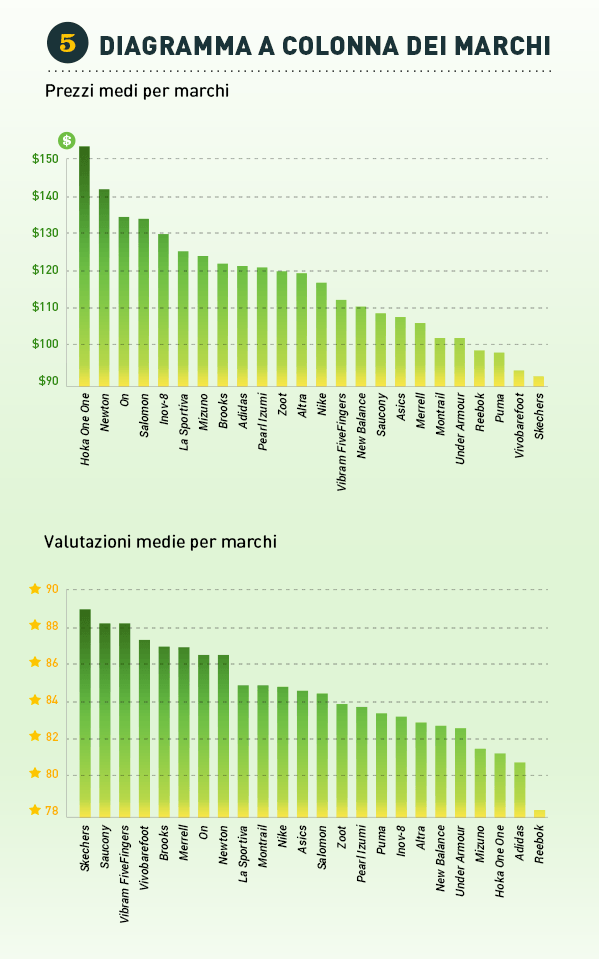
HERE are the best rated brands, from best to worst: Skechers , Saucony , Vibram FiveFingers , Vivobarefoot , Brooks , Merrell , On , Newton , La Sportiva , Nike , ASICS , Salomon , Zoot, Pearl Izumi , PUMA , Inov-8 , Altra , New Balance , Under Armor , Mizuno , Hoka , Adidas and Reebok .
Any biases that could affect the results
No study is perfect. HERE are some of our obstacles:
- One might expect that if a runner buys an expensive shoe, he or she will have higher expectations regarding the quality of the shoe and, therefore, is more likely to be disappointed. True, the more you spend, the more you expect. However, the list price should reflect these expectations. If you spend more on a pair of running shoes, it's logical to expect a better product.
- The reviews come from the RunRepeat.com collector, which attracts a certain type of runner, which could skew the results (in both senses).
That said, we still believe that our conclusion is correct and that potential biases did not significantly affect the data.
About the researchers
Jens Jakob Andersen is the lead researcher behind the study. He was a competitive runner and statistics professor at the Copenhagen Business School, under the supervision of the director of the Finance department Dorte Kronborg. Today, he is the founder and CEO of RunRepeat.com. The research was assisted by Polish statistician Wojciech Fedyszyn and reviewed by dozens of experts before being published. The research was funded by RunRepeat.com Disclaimer: No brands or other institutions influenced us in any way in conducting this research. We conducted it for the purpose of creating transparency in the running shoe market and not to promote specific running shoe brands. No brand was aware of this research.You can use any content (graphics, comments, etc.) as long as you cite the original source. For interviews, please contact lina@runrepeat.com or +1 817 945 66 06, or visit our contact page . Below is the complete infographic. We are happy to share our data; if you are interested, contact us.

